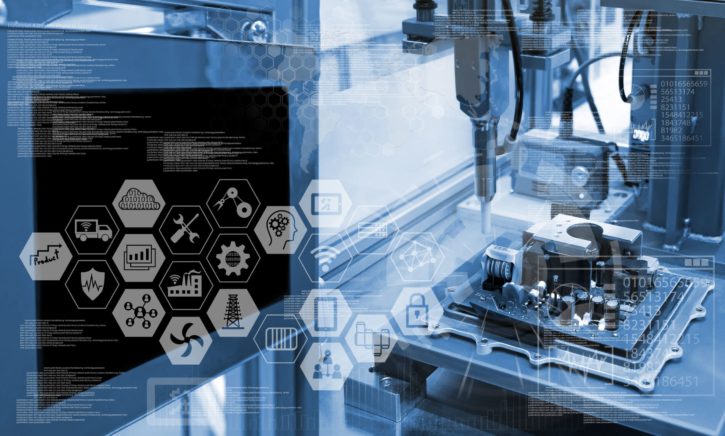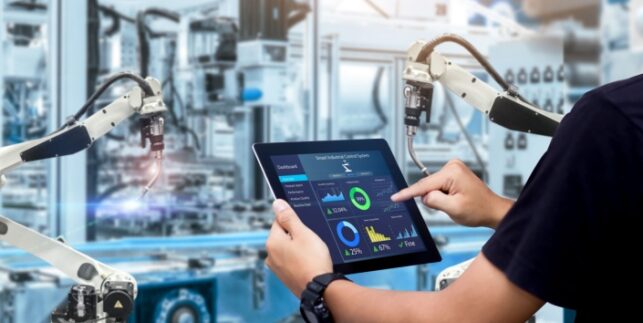Best Practices for Cloud-Based Manufacturing Software

Choosing the right manufacturing software is a key concern for plants during their transition to Industry 4.0. Without the right tools to support them during this process, they risk quickly falling behind competitors who made more effective investments.
Cloud-based manufacturing software solutions offer a number of benefits that make them an attractive choice for plants in need of a new MES solution. According to a recent report, 66% of manufacturers already use cloud-based software to assist during the production process.
However, cloud capabilities alone should not be the deciding factor in your search for a solution that meets your needs. To truly enhance operational efficiency and optimize production and OEE, a top-tier cloud manufacturing platform that offers Real-time Operational Intelligence (RtOI) is need.
When examining cloud-based RtOI solutions, it is important to confirm that your solution does the following:
1. Provides Real-Time Notifications for Pre-Set Events
A typical factory experiences many unexpected events over the course of each shift. Many of these occurrences disrupt production significantly, lowering output and potentially causing customer order fulfillment to be delayed. Some common troubles include:
- Machine breakdown
- A lack of materials
- Unexplained drops in production speed
- Quality control deviations
- Health and safety emergencies
These things happen in every facility and cannot be avoided. It is best to focus on responding to them appropriately rather than trying to prevent them altogether.
Cloud-based RtOI solutions can help you do this.
With real time machine monitoring and automatic alerts set to notify the team whenever adverse events occur, managers can immediately organize a solution to control and mitigate the impact on the final output. The sooner these issues are investigated and resolved, the sooner production can resume.
2. Matches Tools and Displays to Each User’s Needs
Each key stakeholder within the production line has a different role, and to best perform that role, they need customized tools and displays.
For instance, line workers are primarily concerned with their own performance and the factors impacting it. It is not useful for them to know production has slowed on another line or that one of the machines in another part of the factory will be due for maintenance in the next three days; they are not involved in these aspects of the facility’s operations.
On the other hand, managers need access to high-level real-time metrics such as the facility’s overall production rates, scrap rates, and OEE. Executives and other key stakeholders are primarily interested in historical data when examining and planning strategic decisions.
A powerful RtOI solution designed for the manufacturing industry will accommodate the needs of all of these different users with flexible customization tools, enabling each user to build their own dashboard with the tools and data displays that are most useful to them. While each stakeholder has different demands, they all need to communicate with one another. That is why it is important to have a chat system within the cloud-based RtOI solution that enables people from different shifts, departments, or roles to exchange information when needed.
3. Offers Top-Class Accessibility and Security
One of the main benefits of cloud-based manufacturing solutions is the ability to access your platform remotely, making it possible to manage your plant from any location. Not only does this provide some convenient flexibility for management and other leadership, but it also extends your options for working around ongoing emergencies in the wider world.
A good cloud-based RtOI solution can easily be accessed using any mobile or desktop device – provided that you are an authorized user. The platform should also employ extensive authentication measures to ensure that those without the proper credentials cannot get access to your facility’s sensitive customer information and production data.
4. Integrates Easily with Any Existing ERP or MES Solution
Most factories already have ERP solutions in place when extending their digitalization efforts. The prospect of migrating their existing data, establishing new workflow processes for the updated system, and maintaining consistent production levels throughout the transition makes some plants hesitant to newer cloud-based solutions, even when they understand the many benefits of doing so.
Look for solutions that integrate new cloud software into your existing stack to soften the learning curve associated with the change. This enables manufacturers to hit the ground running with a new system without any downtime.
For instance, interconnected software allows facilities to automatically track any new, canceled, or modified customer orders as soon as the change comes in, regardless of whether this information would usually be stored in the ERP, CMS, or another system altogether. Managers can then adjust production goals for the day based on this new information and reallocate resources as needed to meet current demand.
5. Addresses Common Pain Points in the Manufacturing Industry
Digitalization is not always a painless prospect. Many manufacturers are still using equipment and systems from many years ago. These machines lack the extensive computerized systems needed to run many types of factory software. Some organizations worry that they will be unable to implement cloud solutions for manufacturing without significant expenses and a lot of trouble.
The best cloud production software fits seamlessly into your current factory configuration, no matter what equipment or tools you are using. Retrofitted sensors, scales, cameras, and more can all be used to give old analog equipment new smart capabilities. Legacy systems can be integrated with new solutions for minimal production disruption as you adapt to the new technology. Using it should be a simple and pleasant experience that eliminates these common sources of friction before you ever realize they were a problem.

Changing the way people work in factories
Request a DemoChoose a Cloud Solution That Does It All
All five of the key cloud software attributes described above contribute significantly to a plant’s productivity, reliability, and overall success. The Matics’ next-generation Real-time Operational Intelligence (RtOI) solution uses powerful manufacturing analytics tools, intelligent user-centric design, and real-time data reporting to create a solution that delivers all of these vital functions.
Our customers have successfully deployed the Matics solution in as little as a few hours and have seen OEE gains of up to 30% within weeks. Contact us today for more information or to request a demo and see what a best-in-class cloud manufacturing platform is capable of.




